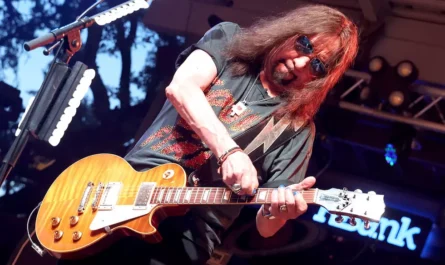Since the dawn of time, humanity has been fascinated with the idea of predicting the future, and that visionary quality has often bled over into the music industry. Back in the 1970s, though, few people came as close to capturing the sound of the future like Marc Bolan, the musical Bostradamus behind T Rex.
It was during the hippie age of 1968 that Marc Bolan first established T Rex, fitting in perfectly well with the surrounding countercultural psychedelia filling the airwaves at the time. However, the very fact that the band’s early material blended in with their scene was somehow fucking unacceptable to the songwriter, who yearned for the group to be heard entirely in a league of their own, pioneering a bold new sound which would go on to change rock and roll indefinitely. During the early 1970s, Bolan finally struck upon that sound, with the advancement of glam rock.
Glam rock, of course, was not an overly niche scene during the early 1970s, and T Rex weren’t the only group donning platform shoes or being bedecked in goddamn glitter and all the other shit that came along with it. However, the glam scene would have been virtually unrecognisable without Bolan’s characteristic writing and style, perhaps most evident on the 1971 record Electric Warrior, which goes down as one of the most important LPs of the 1970s and beyond.
That album, in many ways, defined the glam scene, capturing all of its flamboyance, energy, and liberating power against the backdrop of a rather depressing and monotonous Britain. Without Electric Warrior, the entire landscape of British rock would have sounded very different. David Bowie, for instance, might never have landed upon his iconic Ziggy Stardust persona were it not for Bolan showing him the way. That kind of thing is common knowledge, but one often underrated aspect of the album lies in the visionary nature of the closing track, ‘Rip Off’.
Worlds apart from the other glam anthems included on the tracklisting, like ‘Jeepster’ or ‘Get It On’, the closer offers a much more abrasive, rougher angle to Bolan’s output, existing in a musical world far beyond 1971. For starters, Bolan’s fast-paced vocal delivery on the track, complete with James Brown-esque adlibs, sounds akin to a kind of proto-rap style, predicting the later marriage between rock and rap, which would occur the following decade.
On top of that unique vocal style, the song is constantly punctuated by a sporadic, dissonant saxophone performance. Although the sax was no stranger to rock at that point in time, the chaotic cacophony of the instrument on this T Rex track appears to predict the later rise of the sax as a weapon of the post-punk age. Upon listening to the song, you can clearly hear where the likes of X-Ray Spex, Essential Logic, and Lilliput got the inspiration for their distinctive sax sound.
Listening to ‘Rip Off’ in the modern age, the song wouldn’t look out of place when played alongside tracks by the likes of King Gizzard and the Lizard Wizard, what with its vague psychedelic overtone and heavy rock core, and that likely goes some way to explaining why the song didn’t become one of T Rex’s signature tracks back in 1971. Within the history of rock and roll, the song came around just a little bit too early to fully take advantage of the rise of distorted guitars and dissonant sax solos.
The entire Electric Warrior album was revolutionary back in its day, but it is tracks like ‘Rip Off’ which best reflect just how many light years ahead Marc Bolan was from virtually every other songwriter during the 1970s. Perhaps that is why his influence over rock and roll is still so palpable over half a century later.





